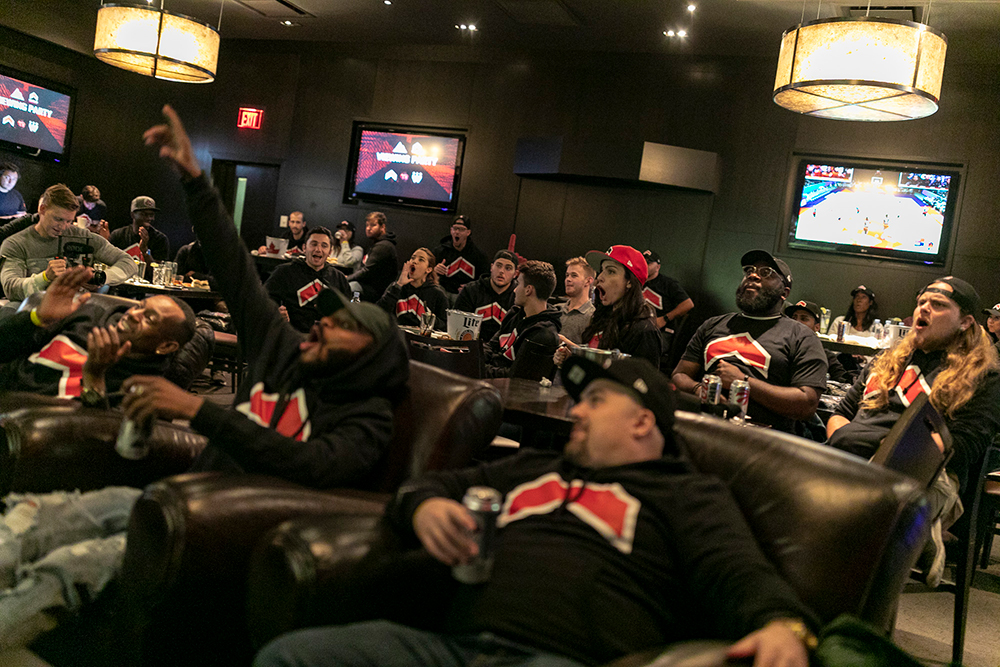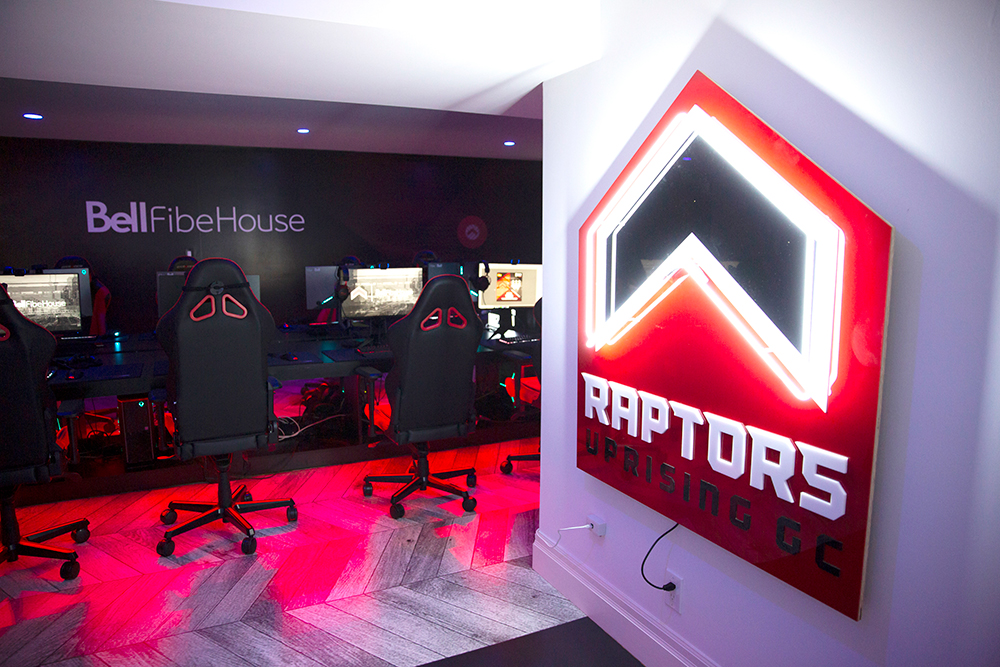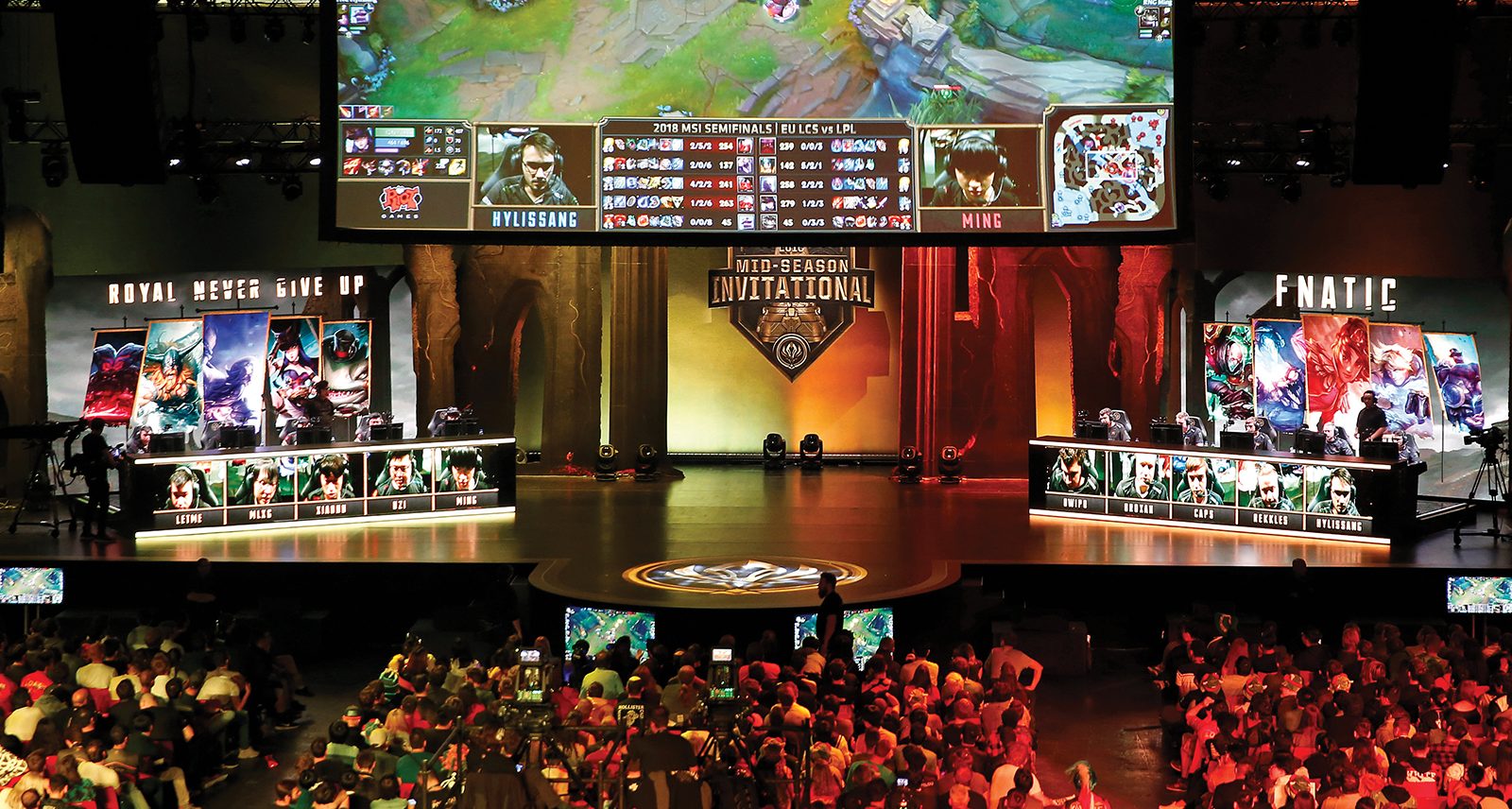The Real Sports Bar & Grill in Toronto beside the Scotiabank Centre is the largest sports bar in the country, with Canada’s largest screen. It wasn’t sold-out for the Super Bowl but tonight, for the launch of a new Toronto foray into esports—competitive video games streamed online, whether played alone or part of teams in big-money leagues—the room is packed by 500 mostly young, mostly male, entirely multi-cultural gamers, and they’re stoked.
It’s the first game of the inaugural season of the Toronto Defiant, a team that plays the game Overwatch—a five-on-five tussle where things constantly explode—against teams from China, South Korea, England, and nine major cities across the US (San Francisco and Los Angeles have two teams apiece). The league is in its second season and franchise rights for the Boston Uprising, owned by the Patriots’ Robert Kraft, cost US$20-million; in Toronto, Chris Overholt, former CEO of the Canadian Olympic Committee, is president of Overwatch Media, who indicates his bosses paid between $30 and $50-million for his team.
Tonight, the Defiant are playing the Houston Outlaws, and they’re good. On the 39-foot foot screen, playing a broadcast on the Amazon-owned gaming site Twitch, things move fast. The action is lasers, force fields and robot destruction set against a background that changes to match all ten players’ points of view. It’s like watching a pinball game from the view of the ball, if there were ten balls firing at the same time. Last year, Overwatch had better viewership numbers streaming online than the NHL had on TV. Its fans are a seachange from Leafs Nation: younger, digital, international. The audience for esports is projected to hit 276-million by 2022. This audience, these owners, these athletes—and “athletes” is the word they use—like Silicon Valley engineers, are geek culture pioneers.

The Defiant are eight players from South Korea between the ages of 18 and 24 who live with a chef and analytics expert in Beverly Hills. They earn a yearly minimum of $50,000. In tonight’s match—three rounds, the winner the first to three sets—they split the opener, then begin trailing, dropping round one, and splitting round two. There are commentators, and sometimes the camera pivots and we see our guys live at Johnny Carson’s old studio in L.A.; they look scared. Then: detonation, finesse, explosion, explosion—Toronto claws back. Super fans wave giant heads of team favourite Roki and hundreds of nerds waving red towels rise from their chairs. The Defiant take round two and, after being bullied by the Outlaws, as media buyers from Sony and Scotiabank eat wings and drink beer, Toronto kicks Houston’s ass.
“Win-a-ble, win-a-ble!” chants the crowd. There’s overtime, a second overtime, then a third. It’s a sport fan’s dream. We get a fourth overtime, and, after Sombra executes a kill on Rawkus, the screen erupts in glorious colour. The place explodes.
•••
Maple Leaf Sports & Entertainment owns the Raptors, Maple Leafs, Toronto FC, Real Sports Bar & Grill, and also invests in esports. Shane Talbot, 32, heads that division. When Amazon paid US$970-million for Twitch, he called it “the steal of the century.”
Currently, MLSE has an NBA 2K team called Toronto Uprising that competes in a league against 21 teams in most other cities with NBA squads, and MLSE also sponsors a player who plays online FIFA professionally, a 24-year-old who practices seven hours a day and is ranked twenty-third in the world. During a tour of Bell Fibe House, a detached waterfront duplex in Toronto’s lower Beach neighbourhood where the Uprising live and sponsors like Bell, Red Bull and Doritos brand the cabinets and walls, Talbot broke down the esports scene. League of Legends, like Overwatch, has its own league with city-based franchises; other games that promote robust esport followings on YouTube and Twitch are Dota 2, Call of Duty, and HALO 3. Paris 2024 Olympic organizers are considering making esports part of their games. Talbot thinks it’s simple which sport has the better athletes.
“Not to diminish pro athletes, but in esports you can’t rely on raw ability,” Talbot says.
For the Defiant, a typical week is rigorously focussed: they have one day off, and scrimmage every day, every night. They work 60-hour weeks, play two hour games, then watch video of their games, analyzed by coaches. Their chef makes Korean food and, during their 15-minute breaks, the guys play ping pong. At least in the NBA, Kawhi Leonard goes home. But the Toronto Uprising and Toronto Defiant both live at work.
“200 million people watched last year’s League of Legends championship. 100 million watched the Super Bowl.”
Still, Talbot says the gig is coveted and, since he’s run promotions with the Leafs and Toronto FC, he knows what he’s talking about when he says traditional sports need what esports delivers: page views. “We’re digital natives, a cohort that traditional media can’t reach.”
Already, T-Mobile, Coca-Cola, Red Bull, Toyota, Uber Eats, Microsoft, and Wealthsimple advertise on Twitch. When Ninja, a blue-haired Fortnight streamer, appeared in the NFL’s Super Bowl ad with Hall of Famers like Dick Butkus, Franco Harris and Mike Singletary, he almost certainly, at US$10-million, earned more in 2018 than them all.
Athletes new to the game seek that windfall.
But before players can earn a Dorito in the Bell House, they play tournaments like the one I went to at Waves E-Games in Vaughan, just north of Toronto. Started by 25-year-old Khaled Sherif in December, Waves hosts 20 esport tournaments per year with cash payouts between $100 and $10,000. With walls painted black and ceilings exposed, it has servers designed for super fast connection so tournaments, like tonight’s can be streamed on Twitch. The room is friendly, male, gloriously mixed racially and 24-year-old Aaron Grandison-Vargas, whose gamer tag is Blacktwins, is its biggest star. He works as a valet and lives with his parents.
“The drive to keep pushing forward is real,” says Blacktwins. His specialty is Super Smash Bros, a cult fighting game. In Detroit, Blacktwins recently competed in his first international competition and finished 49 out of 1,200. “No one can stop me from realizing what I want to do,” he says. It’s a theme reinforced by Waves’ owner, Sherif. “We’re in the middle between the community and the big dogs,” he says, adding that he has plans on opening locations in Montreal and Dubai. “I take pride being a building block for the next generation of stars.”
Blacktwins wears a grey sweatshirt and drinks Red Bull, and when he wins tonight’s tournament, his celebration is faint. “These things, they just fuel the drive to keep going, to work,” he says. It could work for Blacktwins like it worked for Aui_2000, who was employed as a janitor freshman year at the University of British Columbia and discovered, at places like Waves, he had a knack for Dota 2, a first-person shooter like Overwatch. Aui_2000, born Kurtis Ling, dropped out of UBC to play full-time in 2013 and in 2015, he and his team, the Evil Geniuses, played the International at Key Arena in Seattle. The purse was US$16-million. Aui_2000 won.
“That’s the point where everyone was like, ‘Oh shit, maybe we can do this forever!’” the 26-year-old says. Tickets for the International, the first esport tournament with a million-dollar purse, sold out in five minutes. There were 4-million people watching online and 20,000 prescient geeks in the crowd. Kurtis Ling has won US$2-million playing video games. “I’d tell Blacktwins and anyone else, keep grinding,” he says. “I don’t think we’ve come close to seeing the ceiling of how big this thing is.”
•••
In 1981, Donald Sterling bought the NBA’s Los Angeles Clippers for US$12.5 million. In 2014, he sold it for US$2-billion. Chris Overholt, CEO of OverActive Media, which owns the Defiant, thinks the teams may be analogous. Though his team is owned by venture capitalists, many other owners also have properties in traditional sports, such as the Pittsburgh Penguins, New York Mets, and Denver Nuggets.
“10 years ago the Molson family paid $200-million for the Montreal Canadiens and if they sold it today, it would go for north of a billion and their revenue model is no different from ours, except we’re in the Overwatch league,” Overholt explains. The Canadiens, however, have a stadium and the future of esports, ironically, is tied to live, in-person events. A stadium in Toronto, perhaps 5,000 seats, is being planned, and each of the 28 teams in the Overwatch league will host home games in 2020. The athletes will travel from China to Paris to Vancouver to New York. Unlike, say, football players, esport athletes don’t need time to recover or prepare. “We have what the NFL, NBA and Major League Baseball would love,” Overholt says. “We don’t even need a gym.”

So while there’s big plans for the future, esports continue to grow like Tom Brady’s legacy. Madison Square Garden hosted the NBA 2K draft, and the teams were reviewed by Forbes. There have been esport tournaments in London’s Wembley Arena, the Staples Centre in L.A., and the Rogers Arena in Vancouver hosted a sold-out Dota 2 championship with a $27-million purse. The stadium that Khaled Sherif from Waves wants to build in Dubai would have 30,000 seats.
Overholt worked with the Miami Dolphins and Toronto Raptors and engineered Canada’s most successful Olympic games. He says, “200 million people watched the League of Legends championship last year versus 100-million people watching the Super Bowl. I think our business can be as big or bigger than the Canadian Olympic business—in the relative near term.”
Meanwhile, the culture’s shifting and the geeks have not only become rich, but become cool. Drake played Fortnight on Twitch. Members of the FaZe Clan drive McLarens and Lamborghinis and team valuations are through the roof: Cloud 9, a team playing League of Legends, has an estimated value of US$310-million. According to Citigroup analysts, 143-million people watch esports at least once a month. Revenue is expected to hit $1.4-billion by 2021. “We’re making history,” says Adam Adamou, one of the owners of Toronto Defiant. “This isn’t the traditional venture capitalist saying, ‘This is going to be big, get in early.’ This is already the biggest thing in the world.”
•••
Like everything else frothy in life, it’s conceivable this bigness is bogus. In a place built as a cathedral to shiny appearances, the Bell Fibe House, Shane Talbot, the MLSE head of esports, expresses caution. “There’s a lot of funding going on that doesn’t make a ton of sense,” he says, and warns that investors jumping into esports, as they did with cryptocurrencies, tech stocks, and cannabis, could be throwing money at a misunderstood trend. Since the numbers for esports are often lumped together—viewership of NBA 2K + Overwatch + League of Legends + Fortnight, featuring Drake—investors bidding on franchises or advertisers buying space may be spending based on viewership numbers and revenue projections for the entire sport. So when someone buys an Overwatch franchise for US$20-million, like Robert Kraft with the Boston Uprising, it could be he’s betting on 143-million viewers, which isn’t the projected audience for Overwatch, but all of esports. You don’t buy an ad during a baseball game against viewership numbers of the NFL, NBA and PGA Tour combined, yet Talbot thinks even experienced investors may not know exactly what they’re purchasing.
“I hear the argument that investors are setting themselves up to lose money and burning them will be bad,” Talbot says. “You can take something that isn’t much and make it great, but some of the things that are emerging are going to be very difficult to see through to profitability without significantly more funding and investment in later rounds.”
There’s also concern that although esports has numbers, it’s had a hard time activating fans. “Our e-commerce potential is huge, but we’re not monetizing fans well enough,” Talbot says. The future of esports is in capturing non-endemic partners and over-delivering, and this seems to be the long-term plan at Twitch. Amazon started out selling books, now they sell everything. Twitch will expand beyond video games; after all, young men need furniture, airline tickets, and clothes. Targeted ads for Uber Eats are naturally synergistic with esports. But will this audience open savings accounts, buy cars? Talbot isn’t sure. “Consumer behaviour,” he says, “is hard to change.”

Alp Erdogan is the senior investment analyst at Gravitas Financial and he’s been closely following esports. He’s bullish on the segment’s potential. “$3-billion has been invested in esports since 2013 by venture capitalists and its growth hasn’t even started yet in North America,” he says. According to Erdogan, the rollout of 5G technology will enable more Gen X, Gen Z and millenials to use Twitch on their smartphones, and the data points for men under the age of 35—which constitutes 70 percent of the esport demographic—makes esports, from the franchises to the game makers to the platforms to the athletes, too sweet to ignore. “Esports is an organic growth story. I don’t think it’s overhyped. We’re still in its early days.”
•••
Ratings came back from the Defiant game against Houston and there were 13-million people watching in 190 countries. That, for an opening game of a brand-new team. Chris Overholt has hired former colleagues with the Canadian Olympics and recently poached a Google employee. He says the NBA currently generates US$7-billion per season. He thinks, eventually, esports can make more. “Look at the growth of our audience—we can be bigger than the NBA; faster, too,” he says. “These are athletes for a different generation, a different time.”
To hear Overholt describe the Defiant existing in 100 years sounds implausible, but then his partners in the league are some of the biggest names in sport. The games will adjust and the players will change, the platforms will modernize and the future will unveil itself one click at a time. Esports were underground and now they’re mainstream. They went from basements to stadiums, bragging rights to being able to buy your parents a house.
Back at Real Sports, you could sense change was afoot. A teenager might have a poster on their wall of Auston Matthews. They might also have one of Roki, Ninja, Aui_2000 or, someday, Blacktwins. After the Defiant match, the screens at Real Sports revert to basketball — tonight is also the NBA All-Star game, when the best players on earth face each other for a one-night-only athletic spectacle. “Oh my God,” someone in the crowd behind me says. “Look how slow this is. I can’t believe there’s an audience for this.”




